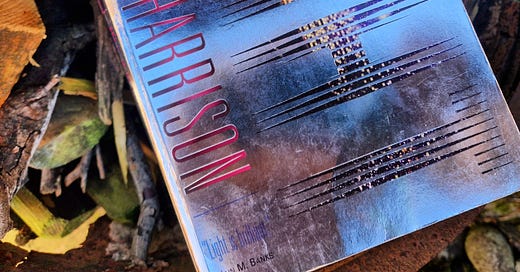“It was only a moment of confusion, but it was carnivorous, and he sensed that by acknowledging it he had allowed it in.”
Every now and then, the ever-evolving landscapes of science fiction are invaded by an author who, for better or worse, strides merrily against the grain. Usually, these authors are writing cyberpunk, and usually, the science fiction community is divided on this grimy, urban fetish bastardisation of the genre. I would describe ‘Light’ as cyberpunk meets New Weird, its three plotlines all riddled with a concoction of gangster crime, genetic modification and overall dystopian flavour with a trippy undertone and a healthy helping of dreamlike prose.
‘New Weird’ is a term that M John Harrison coined in the introduction for China Miéville’s ‘The Tain’ in 2002, but its roots sprang from the creepy depths of H P Lovecraft’s cosmic horror, and the fantasy and horror pulp stories as published in magazines like Weird Tales. A fascinating brew of different influences, then—some of which are present in Harrison’s Light—and it’s a brew that I found myself addicted to ever since I read Jeff VanderMeer’s ‘Southern Reach Trilogy’ and then later, Miéville’s ‘Perdido Street Station.’
What’s my point? Well, if you’re put off by the cyberpunk or New Weird subgenre’s, this is where you can end your review research journey, no more needs to be said. If you’re not put off, read ahead! This review will convince you that Light is one of the most surprising pieces of sci-fi literature ever written!
“Above this clamour rose the sharp, urgent pheromone of human expectation - a scent compounded less of sex or greed or aggression than of substance abuse, cheap falafel and expensive perfume.”
The World Building, and its Execution! It’s easy to create vivid pictures in the readers imagination when the streets are overrun with neon advertisements and vulgar graffiti, and the characters are half choked on hallucinogenic drugs. What’s not easy is to make the grime tasteful, and what I think is the biggest selling point of this novel is that Harrison’s writing style does just so. It is flawless, even beautiful at times. I found myself saving some quotes on my phone’s notepad. I’ll treat you to one below this paragraph. He paints an obscure picture of a reality that is as awe-inspiring as it is messed up, it’s an alien feeling, hard to comprehend kind of world, with passages that flicker between paranoid detective noir, dreamscapes, and violence. I was particularly pleased to see British gangster type stuff happening in the West Midlands, where I’m from. It helped ground this book quite significantly for me, as though one foot was kept at home while the other explored the barely comprehensible settings.
“Suddenly he understood this as a condition of things – if you could see the patterns the waves made, or remember the shapes of a million small white clouds, there it would be, a boiling, inexplicable, vertiginous similarity in all the processes of the world, roaring silently away from you in ever-shifting repetitions, always the same, never the same thing twice.”
The Plot…? Okay, if I have one complaint, it is that the plot is actually three, barely connected ones, and with a conclusion that I can’t remember just a week after finishing it. Something about a singularity event? Whatever it is, it didn’t do it for me. I’m more than fine with nonsense and jibber-jabbering around dreamlike sequences, and I often don’t need a plot at all; but the thing is, there was a distinct feeling that something was going to happen. Three perspectives set over a 401-year timeline with references to commonalities between them seems like a plotty setup, one that gave me the impression that it was all going to converge for some epic finale, or at least something prophetic in the vein of social commentary. I think I’d be okay with the lack of cohesion on the plot front, if that is what was promised all along. But it wasn’t. I was promised convergence and all I got was a messy trip. Did it put me off? Not much. It was saved in a big way by Harrison’s expertly written prose, atmosphere, and weird ideas like human-ship integration and Virtual Reality addiction.
The Characters! Although there were a lot of characters—too many for me to remember, anyway—the punny names and varied personalities made me feel okay about the sheer quantity of them. I mean… The Cray Sisters? Uncle Zip? Mona the Clone? I’m all about that. The zaniness was never pushed too far, though. The character writing was often more tongue-in-cheek than caricature, and overall, I felt the characters were solid if nothing especially spectacular. I was a big fan of Seria Mau Genlicher’s fits of murderous rage, and some of the trippier character stuff was excellent. Ed Chianese’s circus oracle performance shows, in particular, took this book to dark, weird places.
To Conclude: Light is a solid piece of literature. It does some unique things, borrowing from multiple genre’s and throwing in some original hallucinatory bits. Its strongest point is that it is very well written, with its weakest point being the plot (or lack thereof). I would recommend this book to fans of the weird and experimental, especially those who get excited by the exploration of narcotics and dreams. It might be a bit too jarring for the average sci-fi reader.
I personally am looking forward to reading more M. John Harrison.
“He ran until he didn't know where he was, except that it was waste lot midnight. The Kefahuchi Tract almost filled the sky, always growing as you watched, like the genie raging up out of the bottle, yet somehow never larger. It was a singularity without an event horizon, they said, the wrong physics loose in the universe. Anything could come out of there, but nothing ever did. Unless of course, Ed thought, what we have out here is already a result of what happens in there...”




